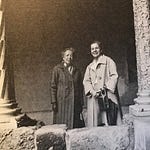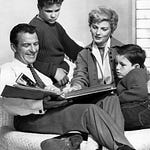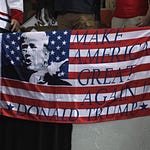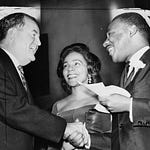
This episode begins with a 1994 exchange between a teenage American voter and sitting President William Jefferson Clinton. Running against an incumbent, Republican George W. Bush, in 1992, Clinton wanted to emphasize his youth. He played the saxophone on the Arsenio Hall Show, and appeared on MTV as part of the cable music channel’s youth voter initiative, “Choose or Lose.” In a town hall-style symposium, when asked by a young voter whether he had ever tried marijuana, Clinton deadpanned: “I didn’t inhale.” It was a canny answer. It showed that he wasn’t a prude, while expressing caution about the wisdom of intoxication. It also made Clinton the first president to talk about recreational drug use outside of a criminal justice context.
Clinton promised to return to the channel if he were elected, and in 1994 he did, leading to the famous “boxers or briefs” episode when he also became the first President to let an audience imagine him in his underpants.
Between 1968 and 1988—that’s five presidential elections—only one Democratic president, Jimmy Carter, won election to the White House. So, MTV was onto something during the Clinton campaign. Recruiting younger voters was a way to break Republicans’ hold on the presidency without being overtly partisan. Like Rock the Vote, an earlier initiative by Virgin Records executive Jeff Ayeroff, MTV sought to elevate its cultural position and use the power of cool to mobilize the 18–29-year-old demographic, only 20% of whom had cast a vote in 1988.
And by the way, of that 20%, a majority, 53%, had voted for Bush.
Between 1972 and 1988, youth voters either tipped Republican, or split evenly, probably reflecting longstanding GOP organizing on college campuses. I talk about this in my book, Political Junkies. Young people voted in relatively small numbers, and they still do. However, in 1992, they tipped Democratic. Only 11% of eligible voters in the 18-24 demographic cast a vote, and 10% between the ages of 25-29, but young people went to Clinton by 13 and 5 points, unseating Bush. And although they voted in even smaller numbers in 1996, young voters leaned even more heavily towards Clinton and away from the lugubrious Republican Senator from Kansas, Bob Dole.
The idea that young people have an investment in the future was the motivating force behind lowering the voting age to 18, a campaign for enfranchisement waged from early 1942 until July 1, 1971, when the 26th Amendment to the Constitution was ratified. For three decades, supporters emphasized military service as the criterion for maturity: men were eligible to be drafted at 18 and could volunteer at 17.
Although they have been voting for 50 years, the 18-24 demographic still does not punch its weight: only 17% cast a ballot in 2020 in an election that boasted a higher participation rate—66.3%--than any other election for 120 years. Yet, even if they do not vote in great numbers, young Americans are increasingly political and, in the absence of a military draft, they mobilize around other issues: the high cost of education, gun violence, racial and economic justice, reproductive rights and climate change are major issues that students promote.
Which is why some politicians, like Representative Ayanna Pressley (D, MA-O7), are suggesting that the federal voting age be lowered to 16, something that has already happened in three Maryland cities and Berkeley, California.
Pressley’s definition of citizenship goes beyond formal national service, linking patriotism to the work young people do in their families and communities. Voting at 16 could become a big issue, in part because it would potentially blunt the impact of voters 65 and over, who vote in much higher numbers and more conservatively. And it’s why I turned to historian Jennifer Frost, Associate Professor of History at the University of Auckland in New Zealand, and her new book, "Let Us Vote!" Youth Voting Rights and the 26th Amendment (2022), just out in paperback from New York University Press.
What would it take to lower the voting age again? How did activists do it the last time?
Show notes:
Do you want to read the 26th Amendent to the Constitution that lowered the voting age to 18? Click here.
Jennifer mentions that she is a historian of the 1960s as well: you might want to check out her book, An Interracial Movement of the Poor: Community Organizing and the New Left in the 1960s (New York University Press, 2001.)
What Claire calls “the Black Freedom Struggle” is also what is commonly known as the civil rights movement. Introduce a young person to this important history with a graphic book by Sherri L. Smith and Tim Foley, What Is the Civil Rights Movement? (Penguin Workshop, 2020.)
Jennifer mentions the importance of Brown v. Board of Education (1954) and its connection to southern politicians’ resistance to youth voting. One good account of Brown, and how it reverberated across the political landscape, is Richard Kluger, Simple Justice: The History of Brown v. Board of Education and Black America's Struggle for Equality (1975; now out from Vintage, 2004.)
Claire mentions the transition of the anti-war movement from peaceful to violent protest: one good account of this is Jeremy Varon, Bringing the War Home: The Weather Underground, the Red Army Faction, and Revolutionary Violence in the Sixties and Seventies (University of California Press, 2004.)
Want to read Oregon v. Mitchell (1970) for yourself? Click here.
Claire and Jennifer discuss the failure of the Equal Rights Amendment. One early analysis was from legal historian Mary Frances Berry, Why Era Failed: Politics, Women's Rights, and the Amending Process of the Constitution (Indiana University Press, 1986.)
You can download this podcast here or subscribe for free on Apple iTunes, Spotify, Google Podcasts, or Soundcloud. And if you liked this episode, please join us at Political Junkie!
Buy a copy of this book directly from New York University Press at 30% off by clicking the link below and using the code:
Orders over $40.00 are also eligible for free shipping!
If you enjoyed this episode, why not try:
Episode 34, “We Demand Equality--NOW! A conversation with historian Katherine Turk about her new book, "The Women of NOW: How Feminists Built an Organization That Transformed America."
Episode 10, “A Woman's Place Is in the House: John Lawrence, former chief of staff to former Speaker Nancy Pelosi, takes us behind the scenes with a new book about a landmark politician who changed the Democratic Party.”
Episode 8, “First, Pick the Right Wife: A conversation with historian Robin Morris, author of "From Goldwater Girls to Reagan Women: Gender, Georgia, and the Growth of the New Right" about how women activists transformed the GOP.”
Episode 1, “Pulling Back the Curtain on Political Campaigns: A conversation with sociologist Daniel Laurison about his new book, "Producing Politics: Inside the Exclusive Campaign World Where the Privileged Few Shape Politics for All of Us."
Want to learn about the history of political media from I.F. Stone to Donald Trump? Consider purchasing a copy of my book, Political Junkies: From Talk Radio to Twitter, How Alternative Media Hooked Us on Politics and Broke Our Democracy (Basic Books, 2023.)














Episode 39: Old Enough To Fight, Old Enough To Vote